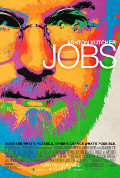
Directed by
Joshua Michael Stern
128 minutes
Rated M
Reviewed by
Bernard Hemingway

Jobs
Synopsis: The story of Steve Jobs' ascension from college dropout to IT industry legend.
David Fincher and Aaron Sorkin showed us that one could make a gripping drama out of the goings-on of computer geeks. So you’d think that the producers of Jobs would have, in the spirit of their subject, gone straight to the top drawer and got the creators of The Social Network on board for this bio-pic of the industry’s most iconic figure. Instead they got Joshua Michael Stern and Matt Whiteley, the former who has directed a couple of films that you’ve never heard of, the latter who has no previous credit to his name but who happens to be the son of one of the producers. Which, of course, is not necessarily a bad thing, but in this case it is certainly not a good one.
The film opens with Steve Jobs entering a lecture hall in 2001 and announcing the launch of the Ipod to a group of adoring staff who dutifully give him a standing ovation. It’s a worry (as it turns out its form gets re-used twice again – at the launches of Apple 2 in 1979 and the Macintosh in 1984) and so is the next sequence which scrolls back in time to the early 70s and tracks Jobs’ beginnings from uni drop-out on the hippie trail to working as a games designer for Atari. The problem is that everything is so clearly contrived to set up the fundamental and recurring premise of the film - that Steve Jobs was a visionary, a perfectionist, indeed, a freakin’ genius.
Not that Jobs is slavishly hagiographic. It does show the less palatable side of the self-obsessed, ruthlessly rationalist personality - he throws his girlfriend out of his house when he learns that she is pregnant and refuses to acknowledge the child, he shafts the people who helped to get him started. It’s potentially rich material for a character study but Stern does nothing with it, glossing over such things as incidental glitches as Jobs lopes off on the next stage of his hero’s journey. The end title which announces that Apple was the world’s most profitable company in 2012 is apparently to be regarded as sweeping all such peccadilloes and their implications before it.
Similarly, Stern at times crafts scenes with dramatic conviction but then consistently stumbles into others which are so laboriously written and excruciatingly manipulative as to lack any credibility (the most bathetic being a conversation between Jobs and a young industrial designer). As for the mysterious holes in the narrative (a wife and child appear out of nowhere, the rejected daughter turns up asleep on his couch)…well, it’s not as if anyone really cares.
Perhaps it is just me but I was reminded of Milos Forman’s 1999 biopic of comedian Andy Kauffman, Man On The Moon. Both men were driven by a burning ambition to achieve their personal vision and both were dogged by a crushing intolerance of their fellow man (Kauffman, like Jobs died of cancer, the latter fact not even being mentioned in Stern’s film). Jobs could have been as good a film. Instead it is a missed opportunity, a hit-and-miss affair burdened by uninspired, overly-sentimentalizing direction.
Possibly propeller-heads will enjoy the old computer equipment and there is some interest in seeing how the home computer developed (the earliest versions had no hard drive and the memory was calculated in kilobytes) but whilst Kutcher is always watchable in the lead and Josh Gad as Steve Wozniak and Dermot Mulroney as Mike Markkula provide engaging support, as a bio-pic Jobs is superficial at best.
FYI: Danny Boyle's 2015 film Steve Jobs did a much better job (so to speak).

Want more about this film?


Want something different?




